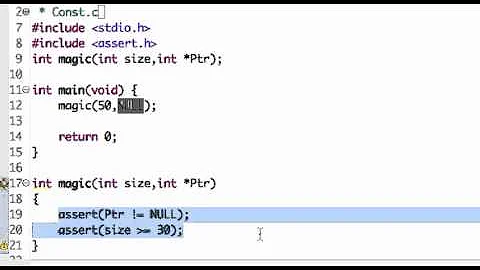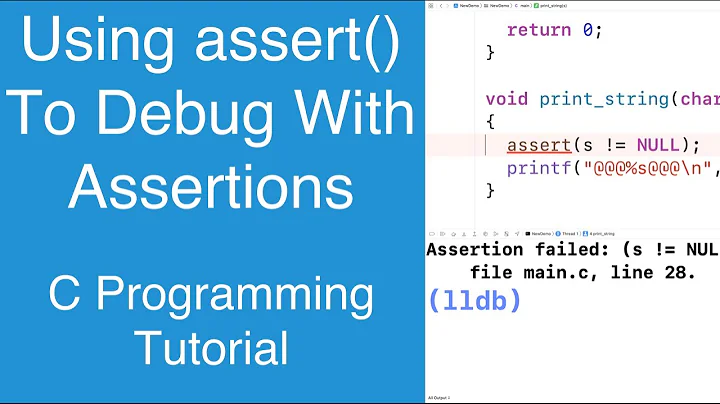Static assert in C
Solution 1
C11 standard adds the _Static_assert keyword.
This is implemented since gcc-4.6:
_Static_assert (0, "assert1"); /* { dg-error "static assertion failed: \"assert1\"" } */
The first slot needs to be an integral constant expression. The second slot is a constant string literal which can be long (_Static_assert(0, L"assertion of doom!")).
I should note that this is also implemented in recent versions of clang.
Solution 2
This works in function and non-function scope (but not inside structs,unions).
#define STATIC_ASSERT(COND,MSG) typedef char static_assertion_##MSG[(COND)?1:-1]
STATIC_ASSERT(1,this_should_be_true);
int main()
{
STATIC_ASSERT(1,this_should_be_true);
}
If the compile time assertion could not be matched, then an almost intelligible message is generated by GCC
sas.c:4: error: size of array ‘static_assertion_this_should_be_true’ is negativeThe macro could or should be changed to generate a unique name for the typedef (i.e. concatenate
__LINE__at the end of thestatic_assert_...name)Instead of a ternary, this could be used as well
#define STATIC_ASSERT(COND,MSG) typedef char static_assertion_##MSG[2*(!!(COND))-1]which happens to work even on the rusty olde cc65 (for the 6502 cpu) compiler.
UPDATE:
For completeness sake, here's the version with __LINE__
#define STATIC_ASSERT(COND,MSG) typedef char static_assertion_##MSG[(!!(COND))*2-1]
// token pasting madness:
#define COMPILE_TIME_ASSERT3(X,L) STATIC_ASSERT(X,static_assertion_at_line_##L)
#define COMPILE_TIME_ASSERT2(X,L) COMPILE_TIME_ASSERT3(X,L)
#define COMPILE_TIME_ASSERT(X) COMPILE_TIME_ASSERT2(X,__LINE__)
COMPILE_TIME_ASSERT(sizeof(long)==8);
int main()
{
COMPILE_TIME_ASSERT(sizeof(int)==4);
}
UPDATE2: GCC specific code
GCC 4.3 (I guess) introduced the "error" and "warning" function attributes. If a call to a function with that attribute could not be eliminated through dead code elimination (or other measures) then an error or warning is generated. This can be used to make compile time asserts with user defined failure descriptions. It remains to determine how they can be used in namespace scope without resorting to a dummy function:
#define CTC(X) ({ extern int __attribute__((error("assertion failure: '" #X "' not true"))) compile_time_check(); ((X)?0:compile_time_check()),0; })
// never to be called.
static void my_constraints()
{
CTC(sizeof(long)==8);
CTC(sizeof(int)==4);
}
int main()
{
}
And this is how it looks like:
$ gcc-mp-4.5 -m32 sas.c
sas.c: In function 'myc':
sas.c:7:1: error: call to 'compile_time_check' declared with attribute error: assertion failure: `sizeof(int)==4` not true
Solution 3
cl
I know the question explicitly mentions gcc, but just for completeness here is a tweak for Microsoft compilers.
Using the negatively sized array typedef does not persuade cl to spit out a decent error. It just says error C2118: negative subscript. A zero-width bitfield fares better in this respect. Since this involves typedeffing a struct, we really need to use unique type names. __LINE__ does not cut the mustard — it is possible to have a COMPILE_TIME_ASSERT() on the same line in a header and a source file, and your compile will break. __COUNTER__ comes to the rescue (and it has been in gcc since 4.3).
#define CTASTR2(pre,post) pre ## post
#define CTASTR(pre,post) CTASTR2(pre,post)
#define STATIC_ASSERT(cond,msg) \
typedef struct { int CTASTR(static_assertion_failed_,msg) : !!(cond); } \
CTASTR(static_assertion_failed_,__COUNTER__)
Now
STATIC_ASSERT(sizeof(long)==7, use_another_compiler_luke)
under cl gives:
error C2149: 'static_assertion_failed_use_another_compiler_luke' : named bit field cannot have zero width
Gcc also gives an intelligible message:
error: zero width for bit-field ‘static_assertion_failed_use_another_compiler_luke’
Solution 4
This answer vastly improved Apr. 17 2022, as an Easter gift.
You can view and test the code below for all versions of C and C++ in my file static_assert_for_all_versions_of_c_and_cpp.c.
Note that C++ style comments are not allowed in ISO C90, so my code samples must use only C-style comments (/* */), instead of C++-style // comments, in order for my code to be able to compile in -std=c90 as well.
Quick summary (TLDR):
If you want a quick and super-simple macro to work in any version of C (when compiled with gcc), or in any version of C++ as of C++11 or later, see my two simple chunks of macros in the bottom of the very next section: "Summary of static assert declarations available in C and C++". Here are those macros copied and pasted for your convenience:
- [the simplest option by far!] For only C11 or later and only C++11 or later:
#include <assert.h> #define STATIC_ASSERT(test_for_true) \ static_assert((test_for_true), "(" #test_for_true ") failed") - Or [MY PREFERENCE], for any version of C (as a gcc extension when using the gcc compiler), including C90, C99, C11, C17, etc., and for C++11 or later (cannot handle older versions of C++):
#ifdef __cplusplus #ifndef _Static_assert #define _Static_assert static_assert #endif #endif #define STATIC_ASSERT(test_for_true) \ _Static_assert((test_for_true), "(" #test_for_true ") failed")
If you want a single STATIC_ASSERT macro to work in all versions of C and C++, I present it in the section which begins with "My final version", below. You can see what build commands and language settings I used to test it in the "Summary of tests" section at the bottom. Getting a static assert to work in pre-C++11, such as C++98, C++03, etc, was the hard part! The _Static_assert_hack macro below is what handles those earlier versions of C++. Here is the full code chunk to handle all versions of C and C++, with most comments removed, for your convenience:
For any version of C and any version of C++:
// See: https://stackoverflow.com/a/54993033/4561887
#define CONCAT_(prefix, suffix) prefix##suffix
#define CONCAT(prefix, suffix) CONCAT_(prefix, suffix)
#define MAKE_UNIQUE_VARIABLE_NAME(prefix) CONCAT(prefix##_, __LINE__)
/* Static assert hack required for **pre-C++11**, such as C++98, C++03, etc. */
/* - It works only with C++, NOT with C! */
#define _Static_assert_hack(expression, message) \
struct MAKE_UNIQUE_VARIABLE_NAME(static_assertion_failed) \
{ \
_Pragma("GCC diagnostic push") \
_Pragma("GCC diagnostic ignored \"-Wunused-local-typedefs\"") \
typedef char static_assertion_failed[(expression) ? 1 : -1]; \
_Pragma("GCC diagnostic pop") \
}
/* For C++ only: */
/* See: https://gcc.gnu.org/onlinedocs/cpp/Standard-Predefined-Macros.html */
#ifdef __cplusplus
#if __cplusplus < 201103L
/* for pre-C++11 */
#ifndef _Static_assert
#define _Static_assert _Static_assert_hack
#endif
#else
/* for C++11 or later */
#ifndef _Static_assert
#define _Static_assert static_assert
#endif
#endif
#endif
/* For C **and** C++: */
#define STATIC_ASSERT(test_for_true) \
_Static_assert((test_for_true), "(" #test_for_true ") failed")
Summary of static assert declarations available in C and C++:
Know that for the:
- C language:
_Static_assert(expression, message)is available in C11 or later.- Per the cppreference.com community wiki link above,
static_assertis also available as a convenience macro to_Static_assert, in the header<assert.h>, in order to match the naming in C++11. So, to get the C++-likestatic_assertas a macro in C11 or later, you should also#include <assert.h>. -
_Static_assert(expression)(ie: without themessagepart) is also available as of C23 or later.
- Per the cppreference.com community wiki link above,
- C++ language:
static_assert(expression, message)is available in C++11 or later.-
static_assert(expression)(ie: without themessagepart) is also available in C++17 or later.
-
- gcc compiler:
- As of gcc compiler version 4.6 and later,
_Static_assertis supported as a gcc extension for all versions of C, including c90, c99, c11, c17, etc.- And, per the C11 standard, as stated above,
static_assertis avaialable as a macro to_Static_assertfor C11 or later if you also#include <assert.h>.
- And, per the C11 standard, as stated above,
- As of g++ compiler version 4.3 and later,
static_assertis supported as a keyword for C++11 or later. You do NOT need to#include <assert.h>in C++ like you do in C to get this format. - GCC source: https://www.gnu.org/software/gnulib/manual/html_node/assert_002eh.html (emphasis added):
Even-older platforms do not support
static_assertor_Static_assertat all. For example, GCC versions before 4.6 do not support_Static_assert, and G++ versions before 4.3 do not supportstatic_assert, which was standardized by C11 and C++11.C
_Static_assertand C++static_assertare keywords that can be used without including<assert.h>. The Gnulib substitutes are macros that require including<assert.h>.- See also: https://gcc.gnu.org/wiki/C11Status --I got this link from the main answer.
- As of gcc compiler version 4.6 and later,
I like to write a STATIC_ASSERT wrapper macro to reduce the arguments down to 1 and automatically produce the message argument so I can do STATIC_ASSERT(expression) instead of STATIC_ASSERT(expression, message). Here is how to easily do that:
- For only C11 or later and only C++11 or later:
#include <assert.h> #define STATIC_ASSERT(test_for_true) \ static_assert((test_for_true), "(" #test_for_true ") failed") - Or [MY PREFERENCE], for any version of C (as a gcc extension when using the gcc compiler), including C90, C99, C11, C17, etc., and for C++11 or later (cannot handle older versions of C++):
#ifdef __cplusplus #ifndef _Static_assert #define _Static_assert static_assert #endif #endif #define STATIC_ASSERT(test_for_true) \ _Static_assert((test_for_true), "(" #test_for_true ") failed") - For versions of C++ older than C++11, you'll have to use a hack to obtain a functional static assert. Use my pretty intricate pre-C++11 static assert hack presented below, or, (even better!), just upgrade to C++11 or later.
Test the above code snippets here in my static_assert_for_all_versions_of_c_and_cpp.c.
Static assert hacks for non-gcc pre-C11, and for pre-C++11
1/2. For C only (ex: useful for non-gcc pre-C11)
For gcc pre-C11, gcc has already defined _Static_assert(expression, message), which is really nice. So, just use that and be done, as described above! But, what if you aren't using the gcc compiler though? What can you do?
Well, I noticed something really interesting. If I use _Static_assert(1 > 2, "this should fail"); in C90 with gcc, using this build command:
gcc -Wall -Wextra -Werror -O3 -std=c90 \
static_assert_for_all_versions_of_c_and_cpp.c -o bin/a -lm && bin/a
I get this compile-time error for that failed _Static_assert. This is a super weird error! This is not an accidental build error though, this is the static assert failure error, because they are also using a hack for this version of C to get compile-time static assertions!
In file included from /usr/include/features.h:461,
from /usr/include/x86_64-linux-gnu/bits/libc-header-start.h:33,
from /usr/include/stdint.h:26,
from /usr/lib/gcc/x86_64-linux-gnu/9/include/stdint.h:9,
from static_assert_for_all_versions_of_c_and_cpp.c:73:
static_assert_for_all_versions_of_c_and_cpp.c: In function ‘main’:
static_assert_for_all_versions_of_c_and_cpp.c:224:5: error: negative width in bit-field ‘__error_if_negative’
224 | _Static_assert(1 > 2, "this should fail");
| ^~~~~~~~~~~~~~
If I go to the gcc source code mirror on GitHub here (https://github.com/gcc-mirror/gcc), clone the repo, and then search for __error_if_negative using grep or ripgrep I find a result in only one location, here: https://github.com/gcc-mirror/gcc/blob/master/libgcc/soft-fp/soft-fp.h#L69-L71:
# define _FP_STATIC_ASSERT(expr, msg) \
extern int (*__Static_assert_function (void)) \
[!!sizeof (struct { int __error_if_negative: (expr) ? 2 : -1; })]
This is a static assertion hack you can borrow and use in non-gcc versions of pre-C11 C!
Just replace _FP_STATIC_ASSERT with _Static_assert, like this:
# define _Static_assert(expr, msg) \
extern int (*__Static_assert_function (void)) \
[!!sizeof (struct { int __error_if_negative: (expr) ? 2 : -1; })]
Caveats of using the _Static_assert hack just above:
- It only works in C, not in C++!
- It does not work inside structs or unions in ISO C--ie: when you use
-std=c90,-std=c99, etc.- It does work, I believe, if you use the gnu C language, such as
-std=gnu90or-std=gnu99, however. - If you try to use it inside a union or struct like this:
...then you'll see this super cryptic error abouttypedef union data_u { data_t data; uint8_t bytes[sizeof(data_t)]; _Static_assert(2 > 1, "this should pass"); _Static_assert(5 > 4, "this should pass"); } data_union_t;expected specifier-qualifier-list before ‘extern’. This is not because the static assertion expression failed (was false), but rather it is because the static assertion hack is broken in this use-case. Notice thatexternis used in the hack above, so, it shows up in the error:eRCaGuy_hello_world/c$ gcc -Wall -Wextra -Werror -O3 -std=c90 static_assert_for_all_versions_of_c_and_cpp.c -o bin/a -lm && bin/a In file included from /usr/include/features.h:461, from /usr/include/x86_64-linux-gnu/bits/libc-header-start.h:33, from /usr/include/stdint.h:26, from /usr/lib/gcc/x86_64-linux-gnu/9/include/stdint.h:9, from static_assert_for_all_versions_of_c_and_cpp.c:73: static_assert_for_all_versions_of_c_and_cpp.c:193:5: error: expected specifier-qualifier-list before ‘extern’ 193 | _Static_assert(2 > 1, "this should pass"); | ^~~~~~~~~~~~~~
- It does work, I believe, if you use the gnu C language, such as
2/2. For C++ only (ex: useful for pre-C++11)
I found it very tricky to get a nice static assertion hack working in pre-C++11 C++, but I got one working! It's quite the work-of-art, but it does appear to work, to work well, and to be robust. It also does work inside structs and unions just like C++11's static_assert does! Here it is. You can test it here in my static_assert_for_all_versions_of_c_and_cpp.c:
#define CONCAT_(prefix, suffix) prefix##suffix
#define CONCAT(prefix, suffix) CONCAT_(prefix, suffix)
#define MAKE_UNIQUE_VARIABLE_NAME(prefix) CONCAT(prefix##_, __LINE__)
/* Static assert hack required for **pre-C++11**, such as C++98, C++03, etc. */
/* - It works only with C++, NOT with C! */
#define _Static_assert_hack(expression, message) \
struct MAKE_UNIQUE_VARIABLE_NAME(static_assertion_failed) \
{ \
_Pragma("GCC diagnostic push") \
_Pragma("GCC diagnostic ignored \"-Wunused-local-typedefs\"") \
typedef char static_assertion_failed[(expression) ? 1 : -1]; \
_Pragma("GCC diagnostic pop") \
}
My final version: a single STATIC_ASSERT() which works with all versions of C and all versions of C++, when compiled with gcc
With just a few tweaks to change which style is used and when, the below code could be made to work with any version of C and C++ on non-gcc compilers, too.
As it is written, I expect it to work for all versions of C and gnu C and all versions of C++ and gnu++ when compiled with either the gcc/g++ compiler or the LLVM clang compiler.
Here is the final version: one static assert to handle any version of C or C++!:
/* --------------------------------- START ---------------------------------- */
/* OR [BEST], for **any version of C OR C++**: */
/* See: https://stackoverflow.com/a/71899854/4561887 */
#define CONCAT_(prefix, suffix) prefix##suffix
/* Concatenate `prefix, suffix` into `prefixsuffix` */
#define CONCAT(prefix, suffix) CONCAT_(prefix, suffix)
/* Make a unique variable name containing the line number at the end of the */
/* name. Ex: `uint64_t MAKE_UNIQUE_VARIABLE_NAME(counter) = 0;` would */
/* produce `uint64_t counter_7 = 0` if the call is on line 7! */
#define MAKE_UNIQUE_VARIABLE_NAME(prefix) CONCAT(prefix##_, __LINE__)
/* Static assert hack required for **pre-C++11**, such as C++98, C++03, etc. */
/* - It works only with C++, NOT with C! */
/* See: */
/* 1. [my ans with this] https://stackoverflow.com/a/54993033/4561887 */
/* 1. Info. on `_Pragma()`: https://stackoverflow.com/a/47518775/4561887 */
/* 1. The inspiration for this `typedef char` array hack as a struct */
/* definition: https://stackoverflow.com/a/3385694/4561887 */
/* Discard the `message` portion entirely. */
#define _Static_assert_hack(expression, message) \
struct MAKE_UNIQUE_VARIABLE_NAME(static_assertion_failed) \
{ \
_Pragma("GCC diagnostic push") \
_Pragma("GCC diagnostic ignored \"-Wunused-local-typedefs\"") \
typedef char static_assertion_failed[(expression) ? 1 : -1]; \
_Pragma("GCC diagnostic pop") \
}
/* For C++ only: */
/* See: https://gcc.gnu.org/onlinedocs/cpp/Standard-Predefined-Macros.html */
#ifdef __cplusplus
#if __cplusplus < 201103L
/* for pre-C++11 */
#ifndef _Static_assert
#define _Static_assert _Static_assert_hack
#endif
#else
/* for C++11 or later */
#ifndef _Static_assert
#define _Static_assert static_assert
#endif
#endif
#endif
/* For C **and** C++: */
#define STATIC_ASSERT(test_for_true) \
_Static_assert((test_for_true), "(" #test_for_true ") failed")
/* ---------------------------------- END ----------------------------------- */
The references I used to help me build this up are in the comments in the source code above. Here are the clickable links copied from there:
- [my answer] How to auto-generate unique variable names with the line number in them by using macros
- I learned this primarily from @Jarod42 here, but also from @Adam.Rosenfield here.
- Info. on
_Pragma(): How to disable GCC warnings for a few lines of code - The inspiration for this
typedef chararray hack as a struct definition: - gcc predefined macros:
C++03 sample static assert error output:
Using the above STATIC_ASSERT in a pre-C++11 use-case, here is some sample code with a static assert which is expected to fail since it is false:
typedef union data_u
{
data_t data;
uint8_t bytes[sizeof(data_t)];
STATIC_ASSERT(2 > 2); /* this should fail */
} data_union_t;
Here is what the build command and failing output looks like. It's a bit of a mouthful of errors for one failed static assert in C++, but this is to be expected for hacks like this, and the gcc C90 hack for _Static_assert, presented previously above, wasn't any better:
eRCaGuy_hello_world/c$ g++ -Wall -Wextra -Werror -O3 -std=c++03 static_assert_for_all_versions_of_c_and_cpp.c -o bin/a && bin/a
static_assert_for_all_versions_of_c_and_cpp.c:129:67: error: narrowing conversion of ‘-1’ from ‘int’ to ‘long unsigned int’ is ill-formed in C++11 [-Werror=narrowing]
129 | typedef char static_assertion_failed[(expression) ? 1 : -1]; \
| ^
static_assert_for_all_versions_of_c_and_cpp.c:139:36: note: in expansion of macro ‘_Static_assert_hack’
139 | #define _Static_assert _Static_assert_hack
| ^~~~~~~~~~~~~~~~~~~
static_assert_for_all_versions_of_c_and_cpp.c:151:5: note: in expansion of macro ‘_Static_assert’
151 | _Static_assert((test_for_true), "(" #test_for_true ") failed")
| ^~~~~~~~~~~~~~
static_assert_for_all_versions_of_c_and_cpp.c:187:5: note: in expansion of macro ‘STATIC_ASSERT’
187 | STATIC_ASSERT(2 > 2);
| ^~~~~~~~~~~~~
static_assert_for_all_versions_of_c_and_cpp.c:129:59: error: size ‘-1’ of array ‘static_assertion_failed’ is negative
129 | typedef char static_assertion_failed[(expression) ? 1 : -1]; \
| ~~~~~~~~~~~~~^~~~~~~~
static_assert_for_all_versions_of_c_and_cpp.c:139:36: note: in expansion of macro ‘_Static_assert_hack’
139 | #define _Static_assert _Static_assert_hack
| ^~~~~~~~~~~~~~~~~~~
static_assert_for_all_versions_of_c_and_cpp.c:151:5: note: in expansion of macro ‘_Static_assert’
151 | _Static_assert((test_for_true), "(" #test_for_true ") failed")
| ^~~~~~~~~~~~~~
static_assert_for_all_versions_of_c_and_cpp.c:187:5: note: in expansion of macro ‘STATIC_ASSERT’
187 | STATIC_ASSERT(2 > 2);
| ^~~~~~~~~~~~~
cc1plus: all warnings being treated as errors
Summary of tests
See static_assert_for_all_versions_of_c_and_cpp.c.
The final STATIC_ASSERT(test_for_true) macro I present just above, which handles all versions of C and C++, was tested on Linux Ubuntu 20.04 with gcc compiler version (gcc --version) 9.4.0 (gcc (Ubuntu 9.4.0-1ubuntu1~20.04.1) 9.4.0).
Here are the various build commands and languages for which it is tested and works. Again, out of all of these versions, the only ones which do not allow the STATIC_ASSERT() macro to be used inside of structs and unions are -std=c90 and -std=c99! All of the other options support the usage of STATIC_ASSERT wherever you want, including outside of functions, inside of functions, and inside of structs and unions.
# -------------------
# 1. In C:
# -------------------
gcc -Wall -Wextra -Werror -O3 -std=c90 \
static_assert_for_all_versions_of_c_and_cpp.c -o bin/a -lm && bin/a
gcc -Wall -Wextra -Werror -O3 -std=c99 \
static_assert_for_all_versions_of_c_and_cpp.c -o bin/a -lm && bin/a
gcc -Wall -Wextra -Werror -O3 -std=c11 \
static_assert_for_all_versions_of_c_and_cpp.c -o bin/a -lm && bin/a
gcc -Wall -Wextra -Werror -O3 -std=c17 \
static_assert_for_all_versions_of_c_and_cpp.c -o bin/a -lm && bin/a
# gnu C
gcc -Wall -Wextra -Werror -O3 -std=gnu90 \
static_assert_for_all_versions_of_c_and_cpp.c -o bin/a -lm && bin/a
gcc -Wall -Wextra -Werror -O3 -std=gnu99 \
static_assert_for_all_versions_of_c_and_cpp.c -o bin/a -lm && bin/a
gcc -Wall -Wextra -Werror -O3 -std=gnu11 \
static_assert_for_all_versions_of_c_and_cpp.c -o bin/a -lm && bin/a
# [my default C build cmd I use today]:
gcc -Wall -Wextra -Werror -O3 -std=gnu17 \
static_assert_for_all_versions_of_c_and_cpp.c -o bin/a -lm && bin/a
# -------------------
# 2. In C++
# -------------------
g++ -Wall -Wextra -Werror -O3 -std=c++98 \
static_assert_for_all_versions_of_c_and_cpp.c -o bin/a && bin/a
g++ -Wall -Wextra -Werror -O3 -std=c++03 \
static_assert_for_all_versions_of_c_and_cpp.c -o bin/a && bin/a
g++ -Wall -Wextra -Werror -O3 -std=c++11 \
static_assert_for_all_versions_of_c_and_cpp.c -o bin/a && bin/a
g++ -Wall -Wextra -Werror -O3 -std=c++17 \
static_assert_for_all_versions_of_c_and_cpp.c -o bin/a && bin/a
# gnu++
g++ -Wall -Wextra -Werror -O3 -std=gnu++98 \
static_assert_for_all_versions_of_c_and_cpp.c -o bin/a && bin/a
g++ -Wall -Wextra -Werror -O3 -std=gnu++03 \
static_assert_for_all_versions_of_c_and_cpp.c -o bin/a && bin/a
g++ -Wall -Wextra -Werror -O3 -std=gnu++11 \
static_assert_for_all_versions_of_c_and_cpp.c -o bin/a && bin/a
# [my default C++ build cmd I use today]:
g++ -Wall -Wextra -Werror -O3 -std=gnu++17 \
static_assert_for_all_versions_of_c_and_cpp.c -o bin/a && bin/a
Related:
- Use static_assert to check types passed to macro [my own answer]
- Use static_assert to check types passed to macro
- How to use static assert in C to check the types of parameters passed to a macro
Solution 5
I would NOT recommend using the solution using a typedef:
// Do NOT do this
#define STATIC_ASSERT(COND,MSG) typedef char static_assertion_##MSG[(COND)?1:-1]
The array declaration with typedef keyword is NOT guaranteed to be evaluated at compile time. For example, the following code in block scope will compile:
int invalid_value = 0;
STATIC_ASSERT(invalid_value, this_should_fail_at_compile_time_but_will_not);
I would recommend this instead (on C99):
// Do this instead
#define STATIC_ASSERT(COND,MSG) static int static_assertion_##MSG[(COND)?1:-1]
Because of the static keyword, the array will be defined at compile time. Note that this assert will only work with COND which are evaluated at compile time. It will not work with (i.e. the compile will fail) with conditions that are based on values in memory, such as values assigned to variables.
Related videos on Youtube
Matt Joiner
About Me I like parsimonious code, with simple interfaces and excellent documentation. I'm not interested in enterprise, boiler-plate, or cookie-cutter nonsense. I oppose cruft and obfuscation. My favourite languages are Go, Python and C. I wish I was better at Haskell. Google+ GitHub Bitbucket Google code My favourite posts http://stackoverflow.com/questions/3609469/what-are-the-thread-limitations-when-working-on-linux-compared-to-processes-for/3705919#3705919 http://stackoverflow.com/questions/4352425/what-should-i-learn-first-before-heading-to-c/4352469#4352469 http://stackoverflow.com/questions/6167809/how-much-bad-can-be-done-using-register-variables-in-c/6168852#6168852 http://stackoverflow.com/questions/4141307/c-and-c-source-code-profiling-tools/4141345#4141345 http://stackoverflow.com/questions/3463207/how-big-can-a-malloc-be-in-c/3486163#3486163 http://stackoverflow.com/questions/4095637/memory-use-of-stl-data-structures-windows-vs-linux/4183178#4183178
Updated on July 08, 2022Comments
-
 Matt Joiner 11 months
Matt Joiner 11 monthsWhat's the best way to achieve compile time static asserts in C (not C++), with particular emphasis on GCC?
-
 Jetski S-type over 1 yearFor C11 on GCC/Clang for equality check with int32_ts, you can even get the compiler to print the incorrect value if it fails! stackoverflow.com/q/53310844/1495449
Jetski S-type over 1 yearFor C11 on GCC/Clang for equality check with int32_ts, you can even get the compiler to print the incorrect value if it fails! stackoverflow.com/q/53310844/1495449
-
-
 Matt Joiner almost 13 yearsIt would be better if you linked to the true source: jaggersoft.com/pubs/CVu11_3.html
Matt Joiner almost 13 yearsIt would be better if you linked to the true source: jaggersoft.com/pubs/CVu11_3.html -
 szx about 11 yearsIn Visual Studio it just says "Negative subscript", not mentioning the variable name...
szx about 11 yearsIn Visual Studio it just says "Negative subscript", not mentioning the variable name... -
 Elazar about 10 yearsNordic Mainframe - option 3 in your answer does not work on clang.
Elazar about 10 yearsNordic Mainframe - option 3 in your answer does not work on clang. -
 Liosan over 9 yearsIt does not work in gcc 4.6 - it says "case label does not reduce to an integer constant". It has a point.
Liosan over 9 yearsIt does not work in gcc 4.6 - it says "case label does not reduce to an integer constant". It has a point. -
 Hashbrown over 8 yearsyou've both probably moved waaay on by now, but I ended up writing my own (see my answer). I used your link @MattJoiner to aid me
Hashbrown over 8 yearsyou've both probably moved waaay on by now, but I ended up writing my own (see my answer). I used your link @MattJoiner to aid me -
 Hashbrown over 8 yearsAnd if you can be bothered, let me know if it works for you, @Liosan. I've only just started delving into C++ so I've come late to the party
Hashbrown over 8 yearsAnd if you can be bothered, let me know if it works for you, @Liosan. I've only just started delving into C++ so I've come late to the party -
 Søren Løvborg over 8 yearsRegarding the last (GCC 4.3+-specific) solution: This is very powerful, as it can check anything the optimizer can figure out, but it fails if optimization is not enabled. The bare minimum optimization level (
Søren Løvborg over 8 yearsRegarding the last (GCC 4.3+-specific) solution: This is very powerful, as it can check anything the optimizer can figure out, but it fails if optimization is not enabled. The bare minimum optimization level (-Og) may often be enough for this to work, however, and should not interfere with debugging. One may consider making the static assert a no-op or runtime assert if__OPTIMIZE__(and__GNUC__) is not defined. -
 P.P over 8 years[...seems to be implemented by gcc, by clang...] You can be more assertive that that ;-)
P.P over 8 years[...seems to be implemented by gcc, by clang...] You can be more assertive that that ;-)_Static_assertis part of the C11 standard and any compiler that supports C11, will have it. -
 user10607 over 8 yearsCan this be used at file scope (outside any function)? Because I get
user10607 over 8 yearsCan this be used at file scope (outside any function)? Because I geterror: expected declaration specifiers or '...' before 'sizeof'for linestatic_assert( sizeof(int) == sizeof(long int), "Error!);(I am using C not C++ by the way) -
 emsr over 8 years@user10607 I'm surprised this doesn't work.. Wait, you're missing a quote at the end of your error string. Put that in and get back. This works for me on gcc-4.9:
emsr over 8 years@user10607 I'm surprised this doesn't work.. Wait, you're missing a quote at the end of your error string. Put that in and get back. This works for me on gcc-4.9:_Static_assert( sizeof(int) == sizeof(long int), "Error!");On my macine I get the error. -
 user10607 over 8 yearsI have gcc 4.8.2 on Ubuntu. The missing quote was a comment typo (I had it in code). This is the first line in a file after a couple of header includes. The compiler gives me two exact same errors:
user10607 over 8 yearsI have gcc 4.8.2 on Ubuntu. The missing quote was a comment typo (I had it in code). This is the first line in a file after a couple of header includes. The compiler gives me two exact same errors:error: expected declaration specifiers or '...' before 'sizeof'ANDerror: expected declaration specifiers or '...' before string constant(he is referring to the"Error!"string) (also: I am compiling with -std=c11. When putting the declaration inside a function all works well (fails and succeeds as expected)) -
 emsr over 8 years@user10607 I also had to specify -std=gnu11 on the command line. I'm really surprised there'd be a difference between 4.8 and 4.8. I have a source with just the one line. I also used the C standard
emsr over 8 years@user10607 I also had to specify -std=gnu11 on the command line. I'm really surprised there'd be a difference between 4.8 and 4.8. I have a source with just the one line. I also used the C standard_Static_assertnot the C++ishstatic_assert. You need to `#include <assert.h> to get the static_assert macro. -
 user10607 over 8 yearsThanks that's it! I was using a c++ oriented IDE that auto highlighted
user10607 over 8 yearsThanks that's it! I was using a c++ oriented IDE that auto highlightedstatic_assertas valid even though I forgot the <assert.h>. Noob trap :)) -
 Coder almost 8 yearsIf it works at all, it would only do so in the source of an executable.
Coder almost 8 yearsIf it works at all, it would only do so in the source of an executable. -
 sundar almost 7 yearsIn the Code snippet with LINE version (UPDATE: For completeness sake, here's the version with `LINE) , when compiling, it errors at the line (STATIC_ASSERT(X,static_assertion_at_line_##L)), which can be corrected by adding one more level like below: #define COMPILE_TIME_ASSERT4(X,L) static_assert(X,#L); #define COMPILE_TIME_ASSERT3(X,L) COMPILE_TIME_ASSERT3(X,""Assertion at:##L"");
sundar almost 7 yearsIn the Code snippet with LINE version (UPDATE: For completeness sake, here's the version with `LINE) , when compiling, it errors at the line (STATIC_ASSERT(X,static_assertion_at_line_##L)), which can be corrected by adding one more level like below: #define COMPILE_TIME_ASSERT4(X,L) static_assert(X,#L); #define COMPILE_TIME_ASSERT3(X,L) COMPILE_TIME_ASSERT3(X,""Assertion at:##L""); -
 ddbug over 6 yearsAs for Visual C++, it has static_assert built-in since version 2010, and it works in both c++ and c modes. However, it does not have the c99 _Static_assert built-in.
ddbug over 6 yearsAs for Visual C++, it has static_assert built-in since version 2010, and it works in both c++ and c modes. However, it does not have the c99 _Static_assert built-in. -
 martinkunev over 6 yearsThere are no namespaces in C.
martinkunev over 6 yearsThere are no namespaces in C. -
 Hashbrown over 6 yearsah, whoops, misread the question. Looks like I came here looking for an answer to C++ anyway (looking at the last line of my answer), so I'll leave it here in case others do the same
Hashbrown over 6 yearsah, whoops, misread the question. Looks like I came here looking for an answer to C++ anyway (looking at the last line of my answer), so I'll leave it here in case others do the same -
 M.M about 6 yearsI use something similar to the
M.M about 6 yearsI use something similar to the__LINE__version in gcc 4.1.1 ... with occasional annoyance when two different headers happen to have one on the same numbered line! -
 Ale over 5 yearsThe
Ale over 5 yearsThetypedefversion works with all compilers. However, if the compiler supports__attribute__((unused)), it is convenient to append it, lest being fussed by-Wunused-local-typedef. -
 sherrellbc about 4 yearsWhile this would work, it would also grow your memory requirements.
sherrellbc about 4 yearsWhile this would work, it would also grow your memory requirements. -
 Gabriel Staples about 4 yearsHere's a simple macro that utilizes gcc's
Gabriel Staples about 4 yearsHere's a simple macro that utilizes gcc's_Static_assert()in C and C++11'sstatic_assertso that it works withgcc,gcc -std=c90,gcc -std=c99,gcc -std=c11, andg++ -std=c++11, etc: stackoverflow.com/a/54993033/4561887 -
 Gabriel Staples about 4 yearsWrapping this up into a generic
Gabriel Staples about 4 yearsWrapping this up into a generic#define STATIC_ASSERT()type macro and providing more generic examples and sample compiler output from your generic examples usingSTATIC_ASSERT()would give you a lot more upvotes and make this technique make more sense I think. -
 Paolo.Bolzoni about 4 yearsI don't agree. The compiler sees thought macros and give a more confusing message.
Paolo.Bolzoni about 4 yearsI don't agree. The compiler sees thought macros and give a more confusing message. -
 Alex D almost 4 yearserror: 'static_assertion_INVALID_CHAR_SIZE' defined but not used [-Werror=unused-variable]
Alex D almost 4 yearserror: 'static_assertion_INVALID_CHAR_SIZE' defined but not used [-Werror=unused-variable] -
 Kami Kaze over 3 yearsWhy so complicated, when there is a
Kami Kaze over 3 yearsWhy so complicated, when there is astatic_assertmacro inassert.h? -
 Gabriel Staples over 3 years@KamiKaze, I'm surprised by your question, as it seems like you may not have actually read my answer? The 2nd line of my answer says it all: "static_assert() is defined in C++11 and later". Therefore,
Gabriel Staples over 3 years@KamiKaze, I'm surprised by your question, as it seems like you may not have actually read my answer? The 2nd line of my answer says it all: "static_assert() is defined in C++11 and later". Therefore,static_assert()isn't available at all in C. See here also: en.cppreference.com/w/cpp/language/static_assert --it showsstatic_assertexists "(since C++11)". The beauty of my answer is that it works in gcc's C90 and later, as well as any C++11 and later, instead of just in C++11 and later, likestatic_assert(). Also, what's complicated about my answer? It's only a couple#defines. -
 Kami Kaze over 3 years
Kami Kaze over 3 yearsstatic_assertis defined in C since C11. It is a macro that expands to_Static_assert. en.cppreference.com/w/c/error/static_assert . Additionally and contrast to your answer_Static_assertis not available in c99 and c90 in gcc (only in gnu99 and gnu90). This is compliant to the standard. Basically you do a lot of extra work, that only brings benefit if compiled with gnu90 and gnu99 and which makes the actual usecase insignificantly small. -
 Gabriel Staples over 3 years> "_Static_assert is not available in c99 and c90 in gcc (only in gnu99 and gnu90)". I see what you mean. It is a gcc extension so you are correct. > "Basically you do a lot of extra work". I disagree; 2 extremely simple defines is by no means "a lot" of extra work. That being said, I see what you mean now. I still think what I've done is useful and adds value to the body of knowledge and answers presented here, so I don't think it merits the downvote. Also, my mistake in saying "C90 and later" instead of "gcc C90 and later", or "g90 and later", was only in my comment above, not in my answer.
Gabriel Staples over 3 years> "_Static_assert is not available in c99 and c90 in gcc (only in gnu99 and gnu90)". I see what you mean. It is a gcc extension so you are correct. > "Basically you do a lot of extra work". I disagree; 2 extremely simple defines is by no means "a lot" of extra work. That being said, I see what you mean now. I still think what I've done is useful and adds value to the body of knowledge and answers presented here, so I don't think it merits the downvote. Also, my mistake in saying "C90 and later" instead of "gcc C90 and later", or "g90 and later", was only in my comment above, not in my answer. -
 Kami Kaze over 3 yearsAs it was factually wrong, a downvote was justified. If you would correct the wrong statements I will check the answer again and may retract my downvote. Still adding such code if not necessary (so if you do not work with gnu90 and gnu99) is not benefical for clarity and adds more clutter. If you have the usecase it might be worth it. But I wonder about the rarity of the usecase of where gnu99/90 and c++11 compability is required.
Kami Kaze over 3 yearsAs it was factually wrong, a downvote was justified. If you would correct the wrong statements I will check the answer again and may retract my downvote. Still adding such code if not necessary (so if you do not work with gnu90 and gnu99) is not benefical for clarity and adds more clutter. If you have the usecase it might be worth it. But I wonder about the rarity of the usecase of where gnu99/90 and c++11 compability is required. -
 Kami Kaze over 3 yearsOkay I see that I was mistaken to some degree
Kami Kaze over 3 yearsOkay I see that I was mistaken to some degree_Static_assertis defined in c90/c99 of gcc, the "problem" is that it works different then in c11. It seems to be similar to what Paolo.Bolzoni presented in his answer as it speaks about negative bitfields. You could clarify that ( I need an edit on the answer to retract the DV) -
 MarcH almost 2 yearsThis can silently succeeds if the argument is not a constant. For instance this does NOT complain if
MarcH almost 2 yearsThis can silently succeeds if the argument is not a constant. For instance this does NOT complain ifnis variable:STATIC_ASSERT(n == 42, always_succeeds). Inside a function this typedefs a variable array which is fine. It does fail if n is a compile-time constant different from 42. Very confusing. -
 MarcH almost 2 yearsThe unused variable warning can be turned off with
MarcH almost 2 yearsThe unused variable warning can be turned off with__attribute__((unused)). I compared this with the typedef solution and the compiler generates the exact same code, most likely because the variable is not used. So this does not grow memory requirements -
 Poniros over 1 yearHow exactly does the double negation of the condition works?
Poniros over 1 yearHow exactly does the double negation of the condition works? -
 Gabriel Staples about 1 yearYou said, "This works in function and non-function scope (but not inside structs,unions)." This is true in C, but in C++, where I am using this for pre-C++11, it works perfectly, including in both structs and unions! Please update your answer to state that, as that's very important info. for anyone looking for a pre-C++11 static assert solution.
Gabriel Staples about 1 yearYou said, "This works in function and non-function scope (but not inside structs,unions)." This is true in C, but in C++, where I am using this for pre-C++11, it works perfectly, including in both structs and unions! Please update your answer to state that, as that's very important info. for anyone looking for a pre-C++11 static assert solution. -
 Gabriel Staples about 1 year@KamiKaze, if you're interested, I just massively rewrote and improved my answer. I finally have produced a single
Gabriel Staples about 1 year@KamiKaze, if you're interested, I just massively rewrote and improved my answer. I finally have produced a singleSTATIC_ASSERT()macro which works in all versions of C and C++ now (tested with gcc compiler)! The big breakthrough for me was coming up with a static assert which would work in C++ pre-C++11, as that was the missing gap prior to my latest discoveries. -
 Gabriel Staples about 1 year
Gabriel Staples about 1 year

![[Lập Trình C] Bài 27: Static Library](vi/mdXlcBrQbPY/hq720_sqp--oaymwEcCNAFEJQDSFXyq4qpAw4IARUAAIhCGAFwAcABBg---rs-AOn4CLCZzXwtvj9VTQkBoNtZr9n5ge0uQQ.jpg)





![[Ngôn ngữ C] Từ khóa "static" trong ngôn ngữ C](vi/OL9jFLXu9R8/hqdefault_sqp--oaymwEcCOADEI4CSFXyq4qpAw4IARUAAIhCGAFwAcABBg---rs-AOn4CLDAooobbOlsUTKdsGgd80WjJ1GGfg.jpg)
